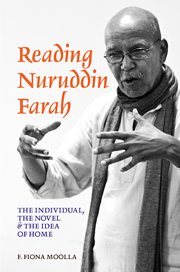Book contents
- Frontmatter
- Contents
- Introduction
- 1 Defining the Individual: Conceptual & Historical Limits
- 2 From a Crooked Rib & the Bildungsroman: Developing the Self, Developing the Nation
- 3 The ‘Gynocentric’ Bildungsroman: Sardines & Gifts
- 4 Modernism in A Naked Needle & Sweet & Sour Milk: Irony, Morality & the Aesthetic
- 5 Close Sesame & the Representation of Heteronomy
- 6 Dissolving the Boundaries of Self & Nation in Maps & Secrets
- 7 Reconstructing the Subject in the Third Trilogy: Links, Knots & Crosbones
- Conclusion
- Bibliography
- Index
Conclusion
Published online by Cambridge University Press: 05 April 2014
- Frontmatter
- Contents
- Introduction
- 1 Defining the Individual: Conceptual & Historical Limits
- 2 From a Crooked Rib & the Bildungsroman: Developing the Self, Developing the Nation
- 3 The ‘Gynocentric’ Bildungsroman: Sardines & Gifts
- 4 Modernism in A Naked Needle & Sweet & Sour Milk: Irony, Morality & the Aesthetic
- 5 Close Sesame & the Representation of Heteronomy
- 6 Dissolving the Boundaries of Self & Nation in Maps & Secrets
- 7 Reconstructing the Subject in the Third Trilogy: Links, Knots & Crosbones
- Conclusion
- Bibliography
- Index
Summary
Philosophy is actually homesickness – the urge to be everywhere at home.
(Novalis, fragment 45, Miscellaneous Fragments, 1798 emphasis in the original.)We are on a mission. Our vocation is the education of the earth.
(Novalis, fragment 32, Miscellaneous Fragments, 1798 emphasis in the original.)This book examines Novalis's observation that philosophy, or the pursuit of truth, is ultimately a form of nostalgia for undivided identity, being one with oneself – being “at home”. Entry into the conception of individual identity however, in itself, fundamentally destabilises the subject thus formed. The question about identity – “Who am I?” – framed as a question asked by the procedurally rational subject, through splitting the observed and observing subjects, fractures the self thus conceived. Novalis perceives very clearly at the historical moment when this form of subjectivity triumphs in European culture that the unity of the subject and, finally also the unity of the subject and object worlds, depend upon disengaging the subject from a social-transcendent horizon, but, crucially, restoring unity through the concept of Dichtung which has been variously translated as art, “poesy” or fiction. This formal understanding of an ethical orientation for self-realisation is different from non-modern conceptions which are ultimately based upon a substantive rationalism constituted against a traditional social-transcendent order. The art which emerges out of this profound shift constitutes a moral horizon unlike any other since it appears to be based wholly upon freedom, not obligation.
- Type
- Chapter
- Information
- Reading Nuruddin FarahThe Individual, the Novel and the Idea of Home, pp. 186 - 189Publisher: Boydell & BrewerPrint publication year: 2014



